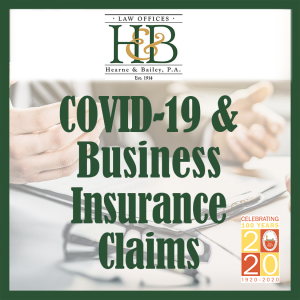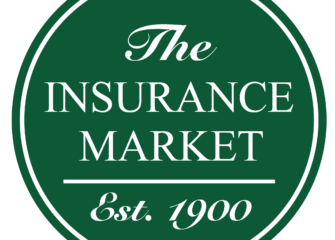
by James L. Otway, Esq.
Are you wondering whether your business insurance will provide any relief from the losses you have sustained due to the COVID-19 closure? The answer is a definite maybe.
This complex question was addressed during a SACC virtual webinar on Wednesday, May 20, 2020. While there are many legal implications specific to the industry and regulatory environment in which a business operates, the webinar offered general points to consider for COVID-19 business insurance claims.
First, you must understand your policy type. In Maryland there are generally three types of commercial property policies: (1) Basic Form, (2) Broad Form and (3) Special Form. Basic coverage covers losses resulting from fire, lightning, wind, hail, and explosion. Broad form covers everything in Basic plus coverage for other perils such as snow or ice damage and coverage for damage during a riot or civil commotion. Special form includes basic and broad coverages as well as direct physical losses not specifically excluded.
Business interruption coverage can be a part of any of these policies and will provide payment of expenses associated with running the business together with lost profits. However, each policy must be examined to determine four key elements: the nature of the losses covered, the relationship between the peril and the loss, the losses specifically excluded, and the proof required by the insurer to substantiate the amount claimed.
A business interruption policy provision may contain language such as:
We will pay for the actual loss of Business Income you sustain due to the necessary “suspension” of your “operations” during the “period of restoration.” The “suspension” must be caused by direct physical loss of or damage to property at premises which are described in the Declarations and for which a Business Income Limit of Insurance is shown in the Declarations.
What constitutes “direct physical damage?” There are many judicial opinions that interpret such damage requires actual destruction of or physical damage to the insured property. However, there are also opinions which state conditions such as mold, radiation or permanent foul odor constituted “physical damage.”
Currently, property owners are filing claims with their insurers claiming that the presence of the COVID-19 virus on the property or in the community constitutes direct physical loss of or damage to the property. How those claims will ultimately be determined remains to be seen.
In addition to business interruption claims, business owners are also claiming coverage for Corona-related losses under the “civil authority” (government mandated shut-down), “dependent property” or “extra expense” (damage by a covered cause to property of another business on which the insured depends to purchase the insured’s goods or services or to supply materials or services to the insured) provisions of their policies..
Insurance companies have already begun denying these claims. It will be up to the courts to decide whether there is coverage under a specific policy for pandemic related losses. Nonetheless, an insured who has sustained losses should submit the claim to their insurer with substantiation of continued business expenses and lost profits (based upon historical earnings). If the claim is denied, consult with an attorney who can review the specific language of your policy and the latest judicial precedent.
Finally, there are indications that future pandemic-related losses may be covered by insurance. The Federal government is considering additional legislation – The Pandemic Risk Insurance Act – which would void insurance policy exclusions if the loss is covered under the Act. The legislation is still in the drafting stage but will likely be modeled after the statute enacted after the World Trade Center terrorist attack when insurance carriers inserted exclusions in property and casualty policies for acts of terrorism.
Otway is a Fellow of The American College of Trial Lawyers and practices civil law in Salisbury, Maryland with the law firm of Hearne & Bailey, PA.




